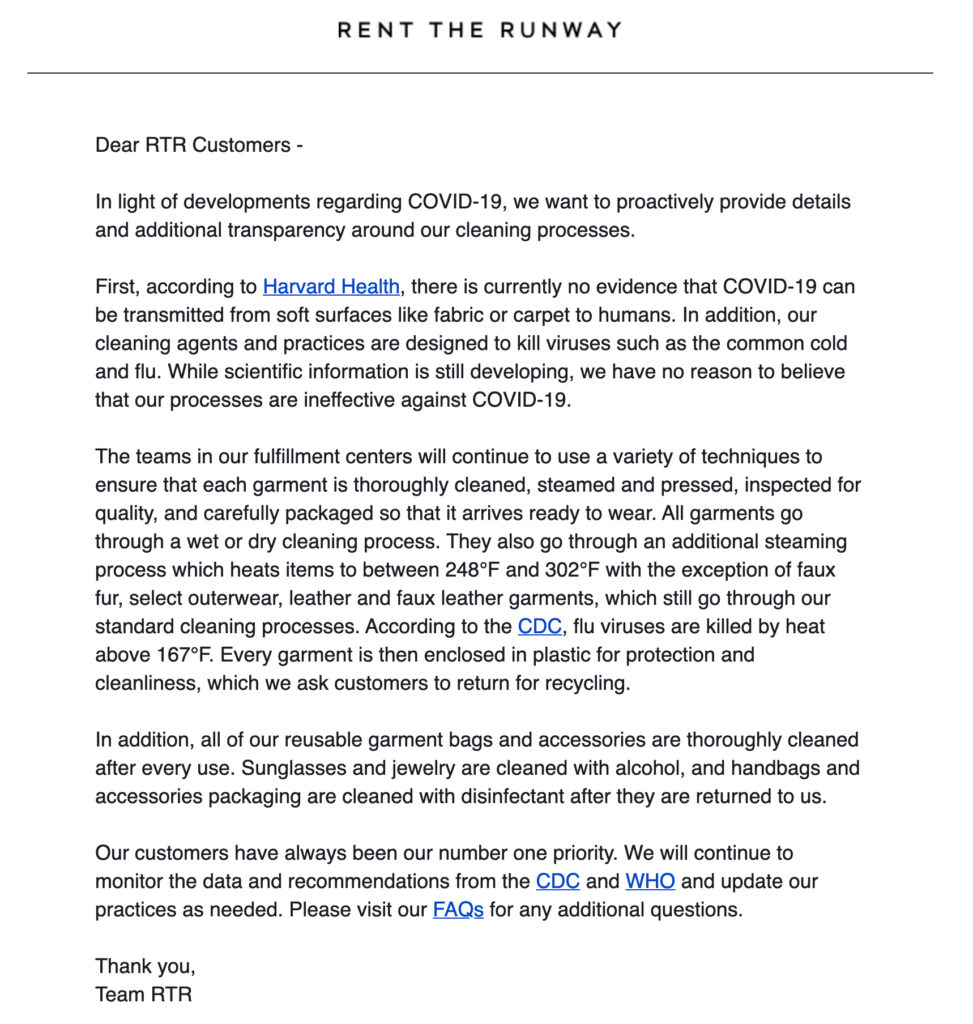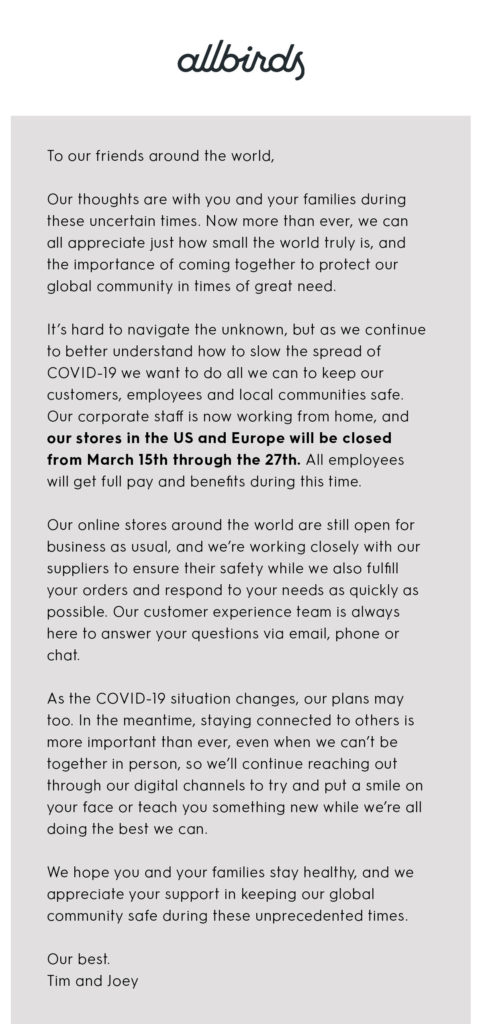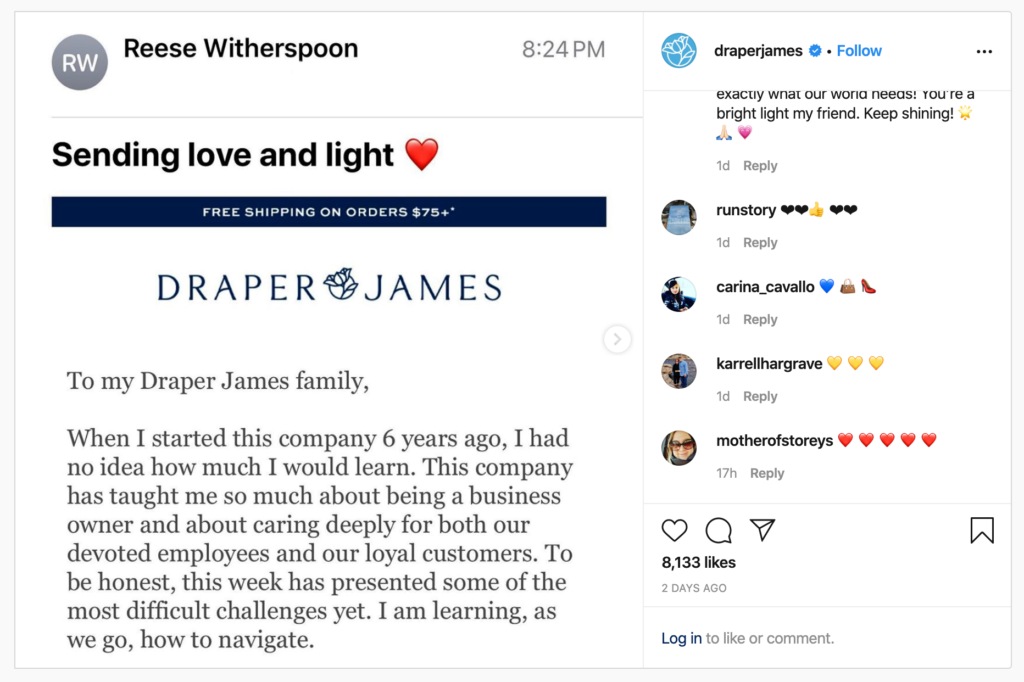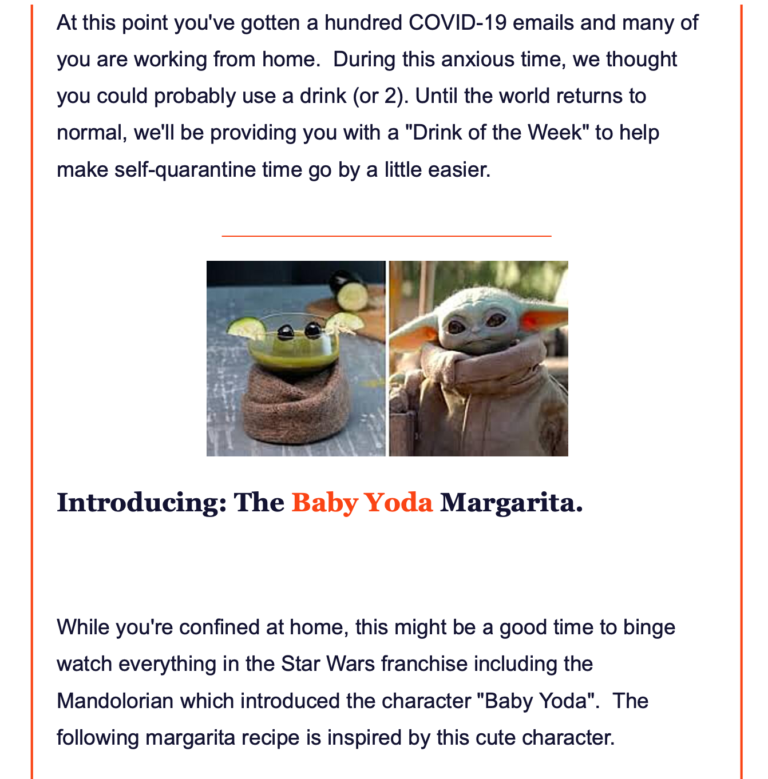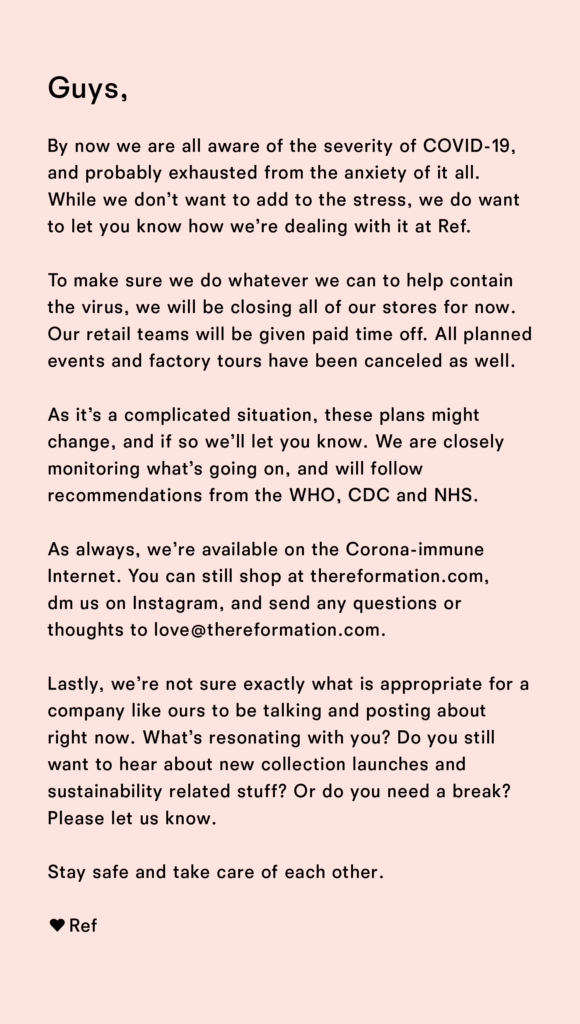Steps to Improve Communication during the Coronavirus Crisis
The past few weeks have been tough as people try to adapt to a new normal amid the coronavirus epidemic. Millions of employees across the world are either out of work or forced to work from home.
Countless businesses are shutting down due to governmental mandates. Furthermore, countries across the world are scrambling with healthcare organizations to combat the disease and help others that have been affected.
In just a few weeks, the world has stood still. Amid this frenzy, properly communicating with your customer base is integral. Many businesses play a vital role in the lives of their clientele.
During this crisis, communication and marketing initiatives don’t just cease. It’s up to you to develop a communication strategy to keep your clientele informed with empathy for their situation.
Without a strategy, how are you going to address central questions for your brand? Are you going to continue your marketing initiatives like usual, or will you change your strategy?
Will you stop your email marketing tasks altogether or communicate the measures you’re taking in this time of crisis. Should you postpone the announcement of a new product? How much communication is ideal, and when is it excessive?
Thinking about all of this can be overwhelming.
This complete guide will explain the measures you can adequately take to ensure that your brand maintains transparency during these hard times.
1. Communicating Company Updates
There are a wide variety of reasons why you will need to send critical company information. Across the world, businesses are either closing or altering their central operations.
Keeping your audience in the dark can lead to rampant dissatisfaction and isn’t necessary since it doesn’t take much effort to send a quick update. Nonetheless, it’s essential that you stay considerate in how often you send company announcements, the manner you communicate these messages, and what information you share.
Here’s a run-down of how you can navigate this route.
A. Initial Responses:
It’s no secret that many brick-and-mortar stores have closed indefinitely. Though, some businesses haven’t closed because they can’t refuse to or are currently developing an operational strategy for moving forward.
If you’ve subscribed to any retail email lists, it’s likely that you have received an email detailing how that company will move forward. If you haven’t, then that presents a significant problem.
For example, many states in the U.S. have declared that all non-essential businesses should close. Still, pharmacies and grocery stores can’t completely close and continue to welcome customers on a limited basis.
With that said, many brands have sent countless emails to their customers detailing these changes. With this overload of information, people can get lost. There is nothing worse than visiting a grocery store with a need only to be turned around when they have closed early.
Also, the coronavirus has created an uncomfortable layer of hysteria and fear. Even if you do provide essential products and services, are you going to communicate a sufficient cleanliness policy?
Otherwise, people may not be willing to visit your company if they feel you aren’t taking the necessary to ensure their safety. Without overloading your audience, you should take the appropriate steps to mitigate their fears.
Rent a Runway sent an email to all of their customers, outlining their cleaning processes to ensure that their customers could not be in contact with the coronavirus through soft surfaces, like clothing or fabric.
Such an email is not only meant to quell the fears of people, but it also provides value to readers, which is the entire point of an email marketing campaign. Rent a Runway regularly rents clothes to their customers, so there would be some health concerns regarding the transmittance of the COVID-19 virus through clothes. This company provided factual information; many people weren’t aware of without making their correspondence seem insignificant or obvious.
B. Retail Closings:
For many brands, the best thing for them to do is close their physical location. Non-essential businesses like insurance companies, gyms, and movie theaters are all closed throughout the country.
Even grocery stores and supermarkets have limited store hours. Customers can be frustrated learning about these hours upon entering a store way too late. However, many stores are taking this time to drive customers to their websites for online purchasing.
What’s more important than making sales is providing insight on why you’re closing, which stores are closing, how long your stores will remain closed, etc. As a business owner, you should communicate the answer to these questions with your audience.
There has to be a defined level of trust between a consumer and a franchise. If you expect your customers to be loyal to you throughout this challenging period, you need to tell them what’s going on.
Allbirds provides an excellent example of how to communicate with an audience on a major retail closing announcement.
This email provides all the information customers need to avoid shopping at their stores until the epidemic has been cleared or another appropriate time. If people need anything during this time, it’s businesses.
If your business is planning on closing, then you need to make the necessary steps of crafting a message that will answer all of their preliminary questions. Otherwise, you’ll run the risk of isolating your audience, forcing them to do business with your competitors instead.
Although it’s not always easy to close your brick-and-mortar store if it’s your main source of income, making your intentions known shows you’re setting an example for social distancing and your dedication to your social responsibility.
Providing this level of communication is beneficial for many reasons. First, it keeps customers up-to-date on the best ways to find their favorite products without any surprises of doing it in person.
Second, it can provide the long-term benefit of keeping your brand ingrained in your customers’ minds the next time they plan to shop.
C. Messaging to Avoid:
Regardless of if stores are open are not, many are encouraging customers to shop online instead. Although this is an excellent way of having your customers support you while they are practicing social distancing habits, there are specific messages you want to avoid sending.
For example, if you want to provide free shipping as an incentive for customers who shop online, avoid naming your promotional code, “coronavirus” or “COVID-19”. This is downright insensitive, and you don’t want your brand to be remembered like this when it comes to navigating a sensitive situation.
Alternatively, highlight the ways you plan on giving back to the community in this time of crisis. A great example of this is how Nunn communicates the benefits of their products while explaining that they will provide free medical care packages to medical professionals.
Again, during this time, where feelings of anxiety, fear, and uncertainty are running rampant, businesses must be sensitive to the language they use in their marketing materials.
You do not want to be known as the company using a crisis to push your marketing strategy forward. Brands must be mindful that their tone is appropriate, without being disrespectful or flippant.
If you are trying to advance your marketing strategy, then do so in a manner that shows active awareness of the struggles that many members of our society face. Moreover, conduct an extensive review of your automated email flows.
Make sure that all of your incoming emails contain relevant and sensitive content that’s fitting for this situation. Ask yourself whether it can be considered helpful and how you can modify existing content that completely misses the mark.
Perhaps there is a way to adapt your content to be more empathetic to your customers’ current situations. Set up a meeting with your marketing staff to brainstorm effective measures of communicating company updates humanely.
2. Sharing Unrelated Content to the Coronavirus
Just because you’re burdened with the pressure of sending company updates doesn’t mean everything you send must be related to the coronavirus. You can continue your other marketing activities as usual, especially if your business is still running.
Again, it’s essential to think carefully about how you will move forward with your marketing strategy. Fortunately, many brands have already set an example of how this should be done.
A. Planned Initiatives:
Before the coronavirus became a global dilemma, you were likely putting the finishing touches on your marketing campaign and deciding which tasks would be vital to your company’s success in 2020.
This doesn’t mean you have to pump the brakes on your upcoming marketing campaign, but it does mean you’ll have to reconfigure it. For example, if you have an upcoming product launch or new collection in the works, how are you going to market it in a way that’s appropriate in today’s climate.
Draper James provides an example of this by sending a carefully-worded email they also posted on social media. The email was written by the company’s founder, Reese Witherspoon, addressing the current situation.
However, the tone of the email was encouraging and attempted to show empathy in a customers’ audience. What’s more, Witherspoon used the email to ask her customers if it would be appropriate to introduce her new clothing line.
This brand successfully navigated their upcoming launch with respect, empathy, and understanding of the situation. They engaged in self-promotion but welcomed feedback to ensure that their customers’ opinions matter genuinely.
A. Spreading Some Joy:
When it comes to developing lasting bonds with your customers, for better and for worse, it’s essential to show compassion for what they may be going through as a person. Considering that the coronavirus is dominating news cycles, people often need a break from reality and a time to smile.
In a few basic ways, you can add joy to the days of your customers by sending quirky emails like the one below.
This company provides a network of bartenders for social events. Knowing that the coronavirus has made their business a bit impractical, they intelligently embraced the situation to provide value to their customers.
In this email, the company provided information on how to make alcoholic beverages at home. This is a stellar way to stay a part of your customer's lives while they can’t physically interact with your business.
B. Asking Your Customers What Inspires Them:
One of the most effective ways of communicating with your audience is by asking what’s relevant to them. Ultimately, no one has all of the answers to what you should say to your customers during this crisis.
After all, all businesses (and their audiences) are different. Some people don’t want constant updates, and others do. To get a better feel for what your customers want, ask them.
Reformation sent out a perfect email to their subscribers asking how they’re responding to the COVID-19 virus and asking them what they should post about.
Emails like this provide value without explicitly doing so. People like feeling that their opinions matter and that they can communicate directly with their favorite brands. While it may take some extra time and effort sifting through responses, you can quickly gain a consensus without doing any guesswork.
Also, you can use this opportunity to segment your audience based on their responses, so no one feels left out. For example, if ⅓ of your audience agreed that promotional emails were still appropriate, put them all in a category to be sent those emails.
Conversely, if ⅕ of your audience would like access to only essential updates, respect their wishes, and follow the previous steps. Making sure that all of your subscribers are receiving the value they ask for is key to retaining them.
Engaged subscribers are more likely to convert. Therefore, if you want to know how you can give your marketing strategy a boost, you should focus on navigating this crisis by continuing to provide value to your subscribers.
This will indirectly allow your customers to stay engaged with you, encouraging them to open their eyes and ears to what you are still offering.
3. Improving Your Marketing Strategy
Businesses are facing tough times amid a global economic crisis caused by the coronavirus. When faced with challenges such as these, you should prepare your company to survive.
This article touched on essential communication methods, but marketing campaigns still have to go on. What have you done to ensure that your campaign is running behind the scenes while you’re not at the office.
If your business is still running, your marketing campaign should still be too. Here are some helpful ways to refine your marketing strategy to achieve flawless results.
A. Work Smart:
The famous saying “out of sight, out of mind” is undoubtedly true, even for businesses. If you don’t interact with your customers, you’ll lose them forever. It’s always more affordable to retain a customer rather than acquire a new one.
These effective customer retention techniques are ideal when you want to work intelligently from afar.
- Use marketing automation software to make your campaign more convenient. This will ensure all essential marketing tasks are being performed while your attention is focused elsewhere.
- Continue producing content. Though, make sure you are writing definite articles that are relevant to today’s situation while getting your main point across.
- Spend more time on social media. While more people are out of work, social media tends to be a popular pastime. Use this opportunity to connect with your customers personally.
B. Update Evergreen Content:
Evergreen content is designed to last, but it can get a bit outdated over time. Marketing campaigns rely on content to convert qualified leads. Therefore, make sure that your evergreen content is up-to-date to receive the best chance of acquiring new customers.
All marketing collateral should be reviewed and updated to add additional information that can be used today.
C. Keep Measuring:
If you don’t measure the performance of your campaigns, then you’ll be pouring money down the toilet as long as it’s running. Proper measuring habits lead to more accountability as far as your marketing spend is concerned.
The best things to measure are referrals, sales, and generated leads. To begin, make sure your Google Analytics platform is set up and configured correctly. The data you receive through this platform will be pivotal to your entire campaign.
Finally, measure the ROI of non-essential marketing initiatives. As your budgets get tiger, you should pause activities of lesser importance, such as guest posting and even link-building.
We Can Get Through It Together!
No one has seen anything like the coronavirus in this Millenium. Needless to say, it has impacted the entire world. Nevertheless, commerce must go on if countries are to stay afloat.
It’s important to realize that your business plays an enormous role in keeping your economy stable. By taking a careful approach to your marketing campaign, you can continue to convert new leads and nurture existing ones.
In time, the collective efforts of businesses and consumers will keep the nation afloat as the world strives to eliminate the virus for good. Do your part in communicating your brand in a positive way to your customers.

